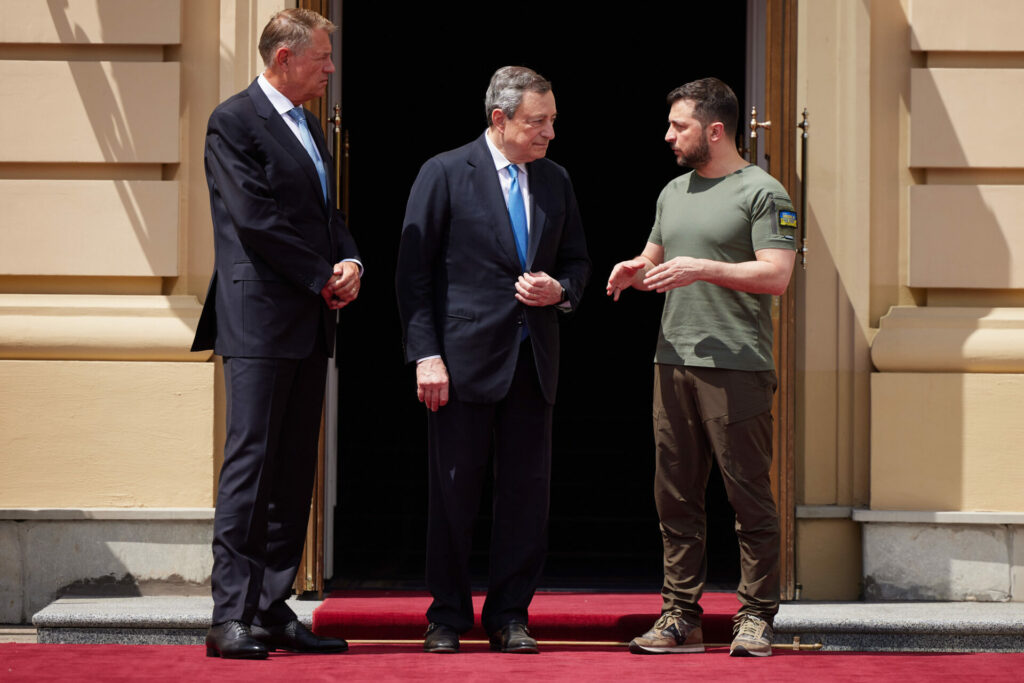French President Emmanuel Macron, German Chancellor Olaf Scholz and Italian Prime Minister Mario Draghi arrived in Kyiv on Thursday by train. The leaders of the EU's three largest economies expressed support for immediately granting Ukraine candidate status at the European summit next week.
However, their apparent support for Ukraine's accession to the EU changes the dynamic of EU enlargement, even while countries such as the Netherlands and Belgium are calling for a more hesitant approach to enlargement.
Joining Romanian President Klaus Iohannis Irpin on Thursday morning, the four heads of state sent a message of European unity in supporting Ukraine. During their meeting with Ukraine's President Volodomyr Zelenskyy, the issue of granting Ukraine candidacy status inevitably came up.
Division in the EU
The European Commission will give its opinion on Ukraine's candidacy on Friday, while EU heads of government will discuss the candidacy of Ukraine, Moldova and Georgia at a summit on 23-24 June. Even if approved, the process to become a member can take several years and can be vetoed by any of the EU27.
Despite expressing solidarity with Ukraine, Member States are divided on granting Ukraine candidacy status. Countries in eastern Europe want to grant candidacy status now and send a message to Russia that Ukraine belongs to Europe. Yet this support is not unanimous with a number of countries, such as the Netherlands and Denmark, having reservations. Until now, the bloc's most influential countries, France and Germany, have expressed doubts.
"We know that there are different sensitivities on the subject within the European Union," a French presidential source told reporters in Reuters. "We believe that the European Union must come out of this crisis stronger, not weakened."
Related News
- Europeans may split over the war in Ukraine, survey says
- Russia cuts gas deliveries through Nord Stream 1 by 40%
- 'Not a photo-op': Macron, Scholz and Draghi arrive in Kyiv
But many Ukrainians are growing tired of the EU's indecision. A potential decision not to recognise Ukraine as a candidate would send the message that the EU doesn't consider the country "a member of the European family", despite declarations of solidarity, wrote two hundred Ukrainian think tanks and NGOs.
Yet the dynamic has changed after Scholz, Macron and Draghi visited Ukraine on Thursday. This brings them in line with countries such as Poland and the Baltic states, which have long supported Ukraine's bid for membership to show Russia that Ukraine is tethered to Europe.
The opposition
The Netherlands, Belgium, Denmark, Sweden and Portugal believe that it would be disingenuous to grant Ukraine candidate status now given that it could be decades before Ukraine gains full membership. These countries cite corruption, unstable institutions, and shortcomings on the rule of law, human rights and protection of minorities as barriers to Ukraine's membership.
They argue that the EU could lose an important lever to induce reforms in Ukraine if it grants candidacy status too easily. In addition, they see it as unfair to the Balkans that Ukraine takes centre stage.
However, Ukrainian NGO Transparency International points out that Ukrainian has created an anti-corruption system from scratch in 2014 and that giving Ukraine candidacy status would galvanize the country to implement the necessary measures to be accepted.

